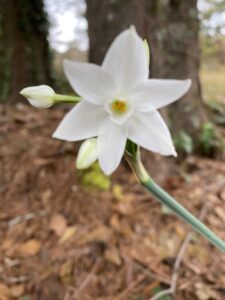Why I’m a reliable part of any winter solstice celebration
As a person with CAD, I'm ready for the promise of longer days and more sun
Written by |

The bonfire crackles. Tendrils of smoke waft their way into the sky, mingling with the first fingers of dawn snaking along the horizon. The faithful druids shrink back into their cowls, trying to stay warm as they await the dawn. They watch the Great Bear in the sky become more and more faint. Finally, the sun breaks over the horizon.
“Hooray,” the worshippers shout.
The sun heralds the start of the shortest day of the year, the time when Earth has tilted on its axis, making it closest to the sun somewhere south of the equator. The druids are celebrating Alban Arthan, a rebirth of light. From this point on, the hours of daylight will become greater and greater. The sun has been reborn.
Cold winter weather is a problem
Although I’m a Christian and definitely not a druid, I, too, celebrate the winter solstice. I’m glad that it’s the start of longer days, because I love being in the sunlight and don’t appreciate an early sundown. As I’m a person with cold agglutinin disease (CAD), that makes sense; I like the warmth of spring and summer, as that’s a major way to avoid the symptoms of CAD. Being in the sun is part of my strategy.
Cold agglutinin disease is a rare autoimmune disorder in which self-targeting antibodies attack and destroy red blood cells at low temperatures. The symptoms we CADdies, as those of us with CAD call ourselves, may experience include fatigue, acrocyanosis (which discolors the skin), Raynaud’s phenomenon, pain, headaches, dizziness, and heart problems. With me, those symptoms are more prevalent during the winter months.
My celebration, thus, is tinged with the knowledge that winter isn’t over with the winter solstice. It’s actually just beginning.
Nevertheless, my spirits are uplifted by the lengthening of the days. No more sunset beginning just after 4:30 p.m.! Dawn will arrive earlier. I’m a morning person, and I love seeing the colors of the dawn shimmering through my garden. Additionally, the mental realization that soon the sun’s rays will be raising the temperature sustains me through the bleak days that I know are coming.
Winter is my least favorite season. It doesn’t help to be told I can always put on more clothes. Just breathing the cold air of January is enough to begin hemolysis, or the destruction of red blood cells that can cause anemia. Once the idea of cold gathers within my being, no amount of clothing can make me feel warm enough. I’d have to put on a “vertical manatee” garment plus a wool scarf over the face opening to even begin to attempt venturing out of doors.
To top it off, January in Alabama, which surely has 172 days, is characterized by gray, overcast skies and drizzling misery all around. Although January is my birth month, I’d prefer that it contain only nine days and give way to February that much sooner.
Winter lasts, just like the other seasons, three months. It’s a challenge for CADdies to develop coping strategies. Mine is to keep my eyes peeled for spring flowers to begin opening. I frequently have a narcissus pop up early in January or even by New Year’s Eve, and the buds of daffodils swell with every passing day. Often, before January is out, there’s even a bud or two dancing in the breeze. As the poet says, “Winter is dead.”
So I celebrate the winter solstice, which this year is on Thursday, Dec. 21. The days will indeed get longer. Meanwhile, the solstice tells me to buckle up, stay warm, and watch for flowers. Warmer days are on their way. I stay focused on the long term and look forward to the spring.
Note: Cold Agglutinin Disease News is strictly a news and information website about the disease. It does not provide medical advice, diagnosis, or treatment. This content is not intended to be a substitute for professional medical advice, diagnosis, or treatment. Always seek the advice of your physician or other qualified health provider with any questions you may have regarding a medical condition. Never disregard professional medical advice or delay in seeking it because of something you have read on this website. The opinions expressed in this column are not those of Cold Agglutinin Disease News or its parent company, Bionews, and are intended to spark discussion about issues pertaining to cold agglutinin disease.







Leave a comment
Fill in the required fields to post. Your email address will not be published.